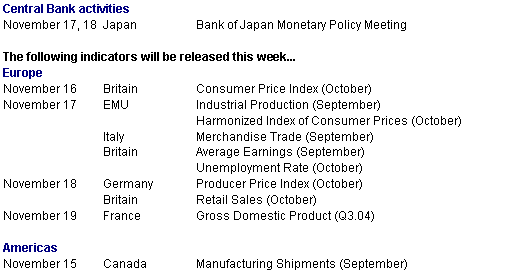Monday, November 15, 2004

Global Markets
The Federal Reserve Open Market Committee did the expected and raised the Fed Funds rate by 25 basis points to 2 percent. Interest rates in the U.S. are now on a par with the European Central Bank's policy rate. The currency markets were unusually volatile on Wednesday as they tried to respond to a slightly improved U.S. merchandise trade deficit - although $51.6 billion is still a huge number. In reaction, the euro briefly jumped over $1.30 for the first time but then retreated to around $1.29. The yen sank as traders got nervous over possible intervention by Japanese authorities. Rhetoric on the other side of the Atlantic soon picked up to more than a low roar as the euro tested the ECB's line in the sand. On the week, only Japanese equities were down. All 13 indexes are now above their 2003 year-end levels.
Global Stock Market Recap

Europe and Britain
The FTSE, DAX and CAC were up on the week after better-than-expected earning reports from telecommunication and insurance companies. Deutsche Telekom raised its earnings forecast and announced its first dividend in three years. Stocks were also lifted by the Federal Reserve's 25 basis point interest rate increase. Investors interpreted the move as a signal that the U.S. economy continues to grow - an important factor given Europe's dependence on exports to the U.S. Even dismal flash GDP data from Germany and France failed to dent investors' sails. Crude prices are down, thanks to increased supply and weaker growth in energy guzzlers such as China. All three indexes closed at their highest in at least 28 months.

Asia/Pacific
Asia/Pacific stocks followed here were up with the exception of those in Japan. Earlier in the week, the Nikkei and Topix were buffeted by the rising yen and fears that exporters' profits will decline when revenues are repatriated. However, investors were reassured about future U.S. growth as the Federal Reserve continued to increase its Fed Funds rate at the measured pace of 25 basis points. Equities rebounded on Friday despite anemic third quarter Japanese GDP growth of 0.1 percent. Investors clearly decided to look at the glass being half full - while exports did not contribute to growth, domestic demand did. This provoked a rally in domestic stocks. The decline in oil prices also helped to alleviate some of the pain - Japan imports virtually all of its crude. Also helping was U.S. data, which at times are followed more closely than domestic data.

Elsewhere, stocks were up on the week after sliding oil prices eased concern that higher fuel costs would slow global economic growth. Investors exhaled in relief about the positive prospects for U.S. growth, and gains in U.S. equities added fuel to that optimism. The view is that lower fuel costs will give U.S. consumers more money to spend on exports (never mind that crude prices are 57 percent above this time last year).

Currencies
The week began with verbal intervention by ECB president Jean Claude Trichet. While attending a central bank governors' meeting in Basel, Switzerland, he launched a surprise attempt to rein in the rising euro by describing recent trading as "brutal". Trichet said, "The recent moves, which tend to be brutal on the exchange markets between the euro and the U.S. dollar, are not welcome from the standpoint of the ECB." (A translator for the Financial Times later explained that when the French describe a change as brutal, they really mean sudden not cruel.) This was a switch from his comments after the ECB meeting earlier this month when Trichet referred only to the dangers of "excessive volatility".
Currencies have been particularly volatile during the past couple of weeks. On Wednesday the dollar hit an all-time low against the euro of $1.3005 in the aftermath of U.S. merchandise trade data. On this up-again down-again day, the dollar climbed to $1.2850 before reports emerged that the ECB would tolerate a euro-dollar rate of $1.35, with only a rate of $1.40 problematic. (This appears to be a new line in the sand for the ECB.) On the week, the dollar was down against the Swiss franc, euro, yen, pound sterling, and the Australian and Canadian dollars.

The dollar dropped the most in five weeks against the yen and weakened against the euro as traders speculated that the Bush administration is not as worried about the dollar's decline as much as Japanese and European officials are. Analysts think that the U.S. will continue to have a policy of benign dollar neglect. Even despite the dismal Japanese GDP report, the yen climbed on Friday thanks in part to an enthusiastic stock market and easing energy prices. The currency was volatile during the week, trading anywhere between 107+ yen to the dollar to slightly above 105 yen.

Other Asian currencies are up primarily because of rising equity markets and the recent slide in oil prices. There was also fresh chatter that the Chinese authorities may allow the heavily managed renminbi (or yuan), which is pegged to the U.S. dollar, greater flexibility in the near future even though there has been no hint regarding the timing of a move. The feeling is based on more frequent official statements on the subject suggesting that this could happen sooner rather than later.
Indicator scoreboard
EMU - Third quarter flash gross domestic product was up 0.3 percent and 1.9 percent when compared with the third quarter in 2003. As with all flash estimates, no data are available for GDP components. The flash estimate is calculated by using available data from Germany, France, Italy, Spain, the Netherlands, Belgium and Greece.

Germany - November ZEW economic expectation index plummeted to 13.9 from 31.3 in October. Those surveyed expressed concerns about the global economic recovery and the strengthening euro which could hurt the export dependent economy. The data are gathered monthly by the Center for European Economic Research (ZEW) in Mannheim. They surveyed 304 financial experts between October 25th and November 8th for their opinions on current economic conditions and the economic outlook for major industrial economies.

September merchandise trade surplus edged down to �12 billion from �12.1 billion in August. Exports were up 1.2 percent and 5.8 percent on the year while imports were up 1.7 percent and 13.1 percent on the year. The increase in imports partly reflects higher oil prices. Imports from non-EU countries - which are affected by the euro's exchange rate - soared by 24.1 percent while exports were up 4.9 percent on the year.

Third quarter seasonally and calendar adjusted flash gross domestic product was up 0.1 percent and 1.3 percent when compared with the same quarter in 2003. According to the Statistics Office, growth was due to a strong increase in domestic demand led by equipment investment and inventories. Flash reports do not contain data for GDP components. These data will be available in about two weeks.

France - September seasonally adjusted industrial production jumped by 3.2 percent and 2.9 percent when compared with last year. Manufacturing output was up 4 percent and 3.8 percent on the year. Over half of the bounce in manufacturing output came from the auto sector, which jumped 22.5 percent after sinking 16.3 percent in August due to a temporary plant shutdown. Industrial production excluding construction jumped 3.2 percent on the year.

Third quarter flash gross domestic product edged up a bare 0.1 percent on the quarter. The results incorporate the August auto assembly plant shutdown which contributed to a steep drop in manufacturing output. As with the other flash GDP estimates, no component data are available.

September merchandise trade deficit improved to �794 million, down from August's �1.751 billion deficit. Exports were up 5.5 percent after sinking 3 percent in August. Imports were up 2 percent after inching up 0.1 percent in the previous month.

Italy - Third quarter preliminary real, seasonally and workday adjusted gross domestic product was up 0.4 percent and 1.3 percent when compared with the same quarter in 2003. No data are available for GDP components in this release.

September seasonally and workday adjusted industrial production was up 0.5 percent and 0.8 percent when compared with last year. Both consumer and investment goods were down on the month while intermediate and energy goods were up. Eleven of the 18 product categories were up on the month. Industrial production excluding construction - the measure used by Eurostat when calculating EMU output - was up 0.5 percent and was unchanged on the year.

Britain - October output price index jumped 0.7 percent and 3.5 percent when compared with last year due to soaring petroleum products costs. Core output prices, which exclude food, beverages, tobacco and petroleum, were up a hefty 0.6 percent and 3 percent on the year. Input prices were up 1.8 percent and 8.4 percent on the year. Crude oil prices were up 11.8 percent and 52.7 percent on the year.
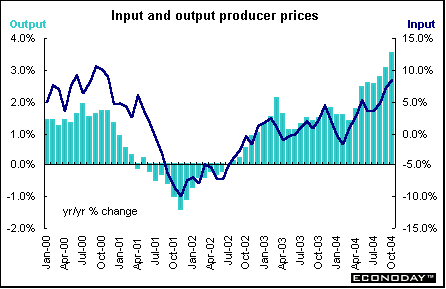
September global merchandise trade deficit eased to Stg4.546 billion from Stg5.163 billion in August. Exports were up 4.8 percent while imports were up only 0.7 percent. The decline was due to a drop in the non-EU trade deficit, which was Stg2.377 billion. Exports were up 11.1 percent while imports were up 1.5 percent. The underlying goods trade deficit, excluding oil and erratics, narrowed to Stg4.52 billion from Stg5.527 billion in August. Oil recorded its first deficit - Stg340 million - since August 1991 and the highest since the mid-1970s due possibly to maintenance work in the North Sea.
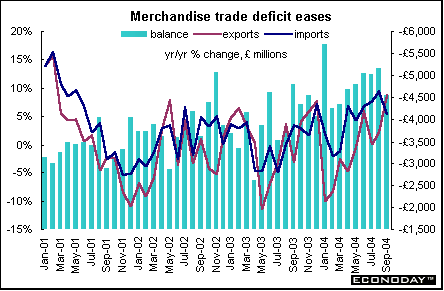
Asia
Japan - October corporate goods price index (CGPI) was down 0.1 percent but up 1.9 percent when compared with the same month a year earlier. High crude oil prices have put upward price pressure on manufacturers and airlines.
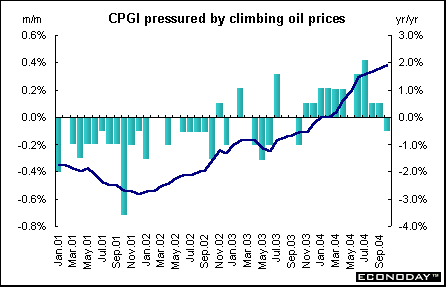
Third quarter gross domestic product was up 0.1 percent and 3.8 percent when compared with the same quarter last year. On an annualized basis, GDP was up only 0.3 percent. Weakening exports and a drop in corporate investment spending contributed to the slowdown in growth. Domestic spending offset the declines.
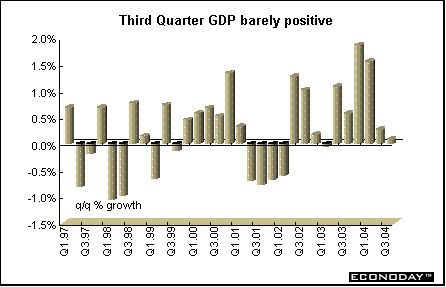
Australia - October employment was up by 43,700 bringing the total number of employed persons to about 9.7 million. The unemployment rate dropped to 5.3 percent from 5.5 percent in September. This is the lowest unemployment rate in more than 26 years. The jobless rate compares with 5.5 percent in the U.S. and 4.6 percent in Japan in September.
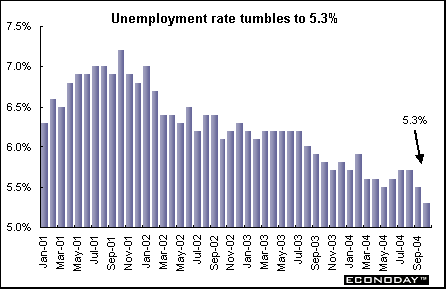
Americas
Canada - September merchandise trade surplus dropped to C$5.1 billion from C$6.4 billion in the previous month. Exports declined 3.4 percent while imports were up 0.4 percent. Exports were down across the board. The trade surplus with the U.S. was down 2.7 percent to C$7.9 million. Exports to the U.S. declined 2.7 percent while imports from the U.S. were up 0.9 percent. Besides the U.S., exports were also down to Japan and the European Union. The non-U.S. trade deficit widened to C$2.8 billion from C$2.5 billion in August.
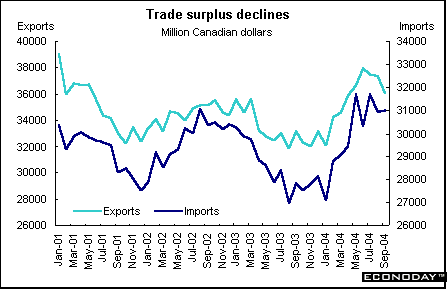
Bottom line
The GDP data released last week were disappointing for Germany, France and Japan in particular. Yet equity investors preferred to look to rosier news from other quarters. Certainly the recent decline in crude prices seemed to offer a ray of sunshine in an otherwise dismal picture as traders changed perceptions about oil supplies from one of tightness to one of plenty. Slower growth helps ease supply concerns and takes some of the upward pressure off of oil prices. With crude prices dampening third quarter growth, any relief that buoys investor spirits and renews optimism is welcome. On Friday oil prices inched up after forecasters - the weather kind - predicted colder weather and with it higher heating oil consumption. And with supplies reliant on the Middle East tinderbox, a reversal of fortune cannot be ruled out.
Looking Ahead: November 15 through November 19, 2004
